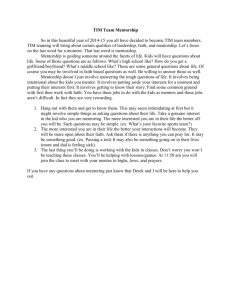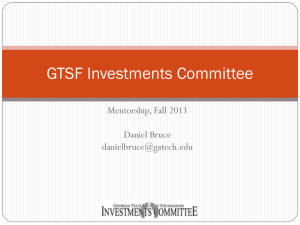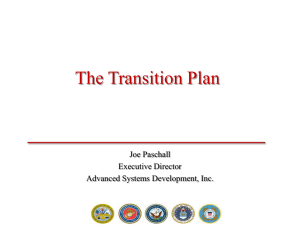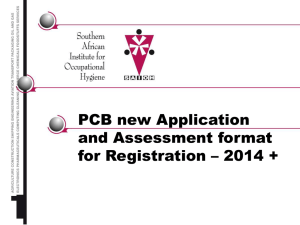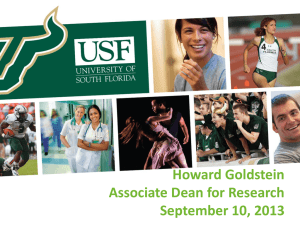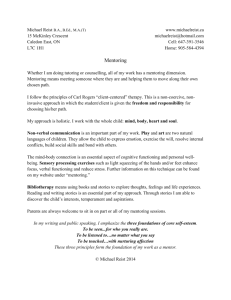Title: Mentorship for newly appointed physicians: A strategy for
advertisement
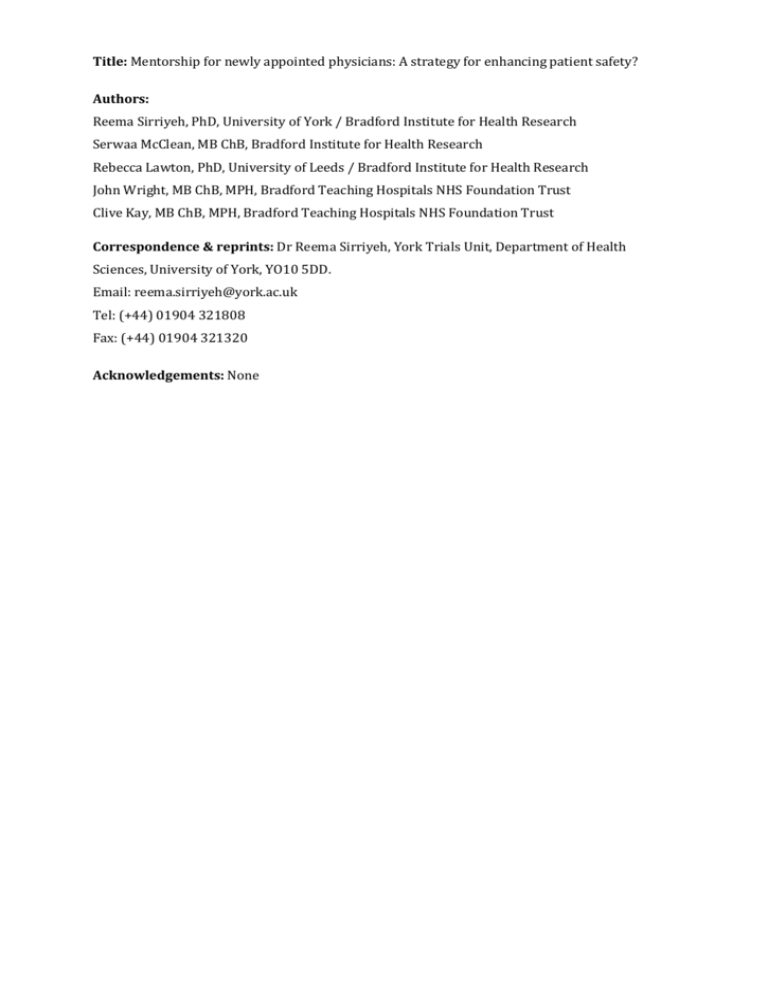
Title: Mentorship for newly appointed physicians: A strategy for enhancing patient safety? Authors: Reema Sirriyeh, PhD, University of York / Bradford Institute for Health Research Serwaa McClean, MB ChB, Bradford Institute for Health Research Rebecca Lawton, PhD, University of Leeds / Bradford Institute for Health Research John Wright, MB ChB, MPH, Bradford Teaching Hospitals NHS Foundation Trust Clive Kay, MB ChB, MPH, Bradford Teaching Hospitals NHS Foundation Trust Correspondence & reprints: Dr Reema Sirriyeh, York Trials Unit, Department of Health Sciences, University of York, YO10 5DD. Email: reema.sirriyeh@york.ac.uk Tel: (+44) 01904 321808 Fax: (+44) 01904 321320 Acknowledgements: None MENTORSHIP FOR NEWLY APPOINTED PHYSICIANS: A STRATEGY FOR ENHANCING PATIENT SAFETY? ABSTRACT Objective: Mentorship is an increasingly popular innovation from business and industry that is being applied in healthcare contexts. This paper explores the concept of mentorship for newly appointed physicians in their first substantive senior post, and specifically its utilisation to enhance patient safety. Methods: Semi structured face to face and telephone interviews with Medical Directors (5), Deputy Medical Directors (4) and Clinical Directors (6) from nine acute NHS Trusts in the Yorkshire and Humber region in the north of England. A focused thematic analysis was used. Results: A number of beneficial outcomes were associated with mentorship for newly appointed physicians including greater personal and professional support, organisational commitment and general well-being. Providing newly appointed senior physicians with support through mentorship was considered to enhance the safety of patient care. Mentorship may prevent or reduce active failures, be used to identify threats in the local working environment and in the longer term address latent threats to safety within the organisation by encouraging a healthier safety culture. Conclusions: Offering mentorship to all newly appointed physicians in their first substantive post in health care may be a useful strategy to support the development of their clinical, professional and personal skills in this transitional period that may also enhance the safety of patient care. INTRODUCTION In recent years mentoring has become increasingly common as a strategy for workforce development in business and industry. In this paper we review the evidence for the role of mentoring in patient safety and describe the results of a study exploring the potential of mentoring to enhance patient safety. Mentoring is conceptualised in various ways depending on the context and its purpose. Here, we explore mentoring for newly appointed senior medical staff. We work to the definition used frequently in UK healthcare, particularly with reference to mentoring physicians, presented by the Standing Committee on Postgraduate Medical and Dental Education (SCOPME; 1998) which describes mentoring as: “The process whereby an experienced, highly regarded, empathic person (the mentor), guides another individual (the mentee) in the development and re-examination of their own ideas, learning, and personal and professional development. The mentor who often, but not necessarily, works in the same organisation or field as the mentee, achieves this by listening and talking in confidence to the mentee” (SCOPME, 1998; p1) Mentorship for safety in industry Parallels are often drawn between health care and high risk, high reliability industries e.g. aviation in which major safety events occur infrequently but can have catastrophic repercussions. Pilots and physicians both work in complex environments in which teams and technology interact (Helmreich, 2000). Innovations in such industries have been increasingly applied in health care settings in an attempt to develop safer systems and reduce the risk of error. Mentorship is one such example that has attracted much interest. The inverse relationship between crew experience and accident rates (Taylor, 1998) is one of the factors that led to the widespread adoption of mentoring models in aviation, in which more experienced pilots supervise and guide those that have recently completed their training successfully. A mentoring approach is recommended internationally by major aviation regulators (e.g. FAA, 2009), and health care organisations are now asking whether this is an appropriate strategy for supporting new physicians in their transition from trainee to independent practice. Mentoring in healthcare Informal mentoring models in which more experienced clinicians guide and support their juniors in developing clinical skills have been adopted for generations. Although the number of formalised schemes in healthcare are increasing (DH, 2004; Freeman, 2000; Mark, Link, Morohan, et al, 2001; Morzinski, Simpson, Bower, et al, 1994; Pololi, Knight, Dennis, et al, 2002), mentoring relationships largely occur during training (often with those who also have educational supervision responsibilities), and after that, tend to develop casually or through schemes aimed at those in difficulty or in minority groups (Buddeberg-Fischer & Herta, 2006; Gupta & Lingham, 2000; Johnson, Williams & Jayadevappa, 1999; Paice, 2009; Royal College of Obstetricians and Gynaecologists; RCOG, 2012; Royal College of Surgeons of England; RCSEng, 2012). The SCOPME (1998) report and a synthesis of evidence and original research presented by the Department of Health from the Improving Working Lives Inquiry (Oxley, Fleming, Golding, et al, 2003) present evidence of wide-ranging personal, professional and educational benefits associated with formal and informal mentorship. Both major reviews conclude that mentorship is valuable for supporting physicians (and dentists) throughout their careers, and in particular through transitional periods. Benefits for mentees include improved job satisfaction, personal and professional well-being, and feelings of self-worth, whilst mentors may experience heightened motivation, confidence and greater career development opportunities (Oxley, 2003). Similar findings revealing benefits of mentoring at individual and organisational level have emerged from the extensive literature around mentoring physicians in the USA (Barr, Shaffer, Valley et al, 1993; Pololi, Knight, Dennis et al, 2002; Rodenhauser, Rudishill, Dvorak, 2000; Wright, Dirsa, Martin, 2002). The latest General Medical Council (GMC) guidance Leadership and management for all doctors (2012) supports mentoring as a strategy that facilitates physicians to fulfil their role as clinician and leader in the modern NHS. The guidance encourages new physicians to accept opportunities for mentorship and senior staff to act as mentors. Moreover, a recent survey of acute NHS Trusts in the UK revealed unanimous support from 64 Trusts for the introduction of mentorship for newly appointed consultants1, indicating organisational demand for such schemes [Personal communication to acute NHS hospital trusts from Dr Patrick Cardigan, Royal College of Physicians, 6th January 2012]. Mentorship for safety in health care Organisations that advocate mentoring for physicians, such as the British Medical Association (BMA), Royal College of Surgeons of England and the GMC, highlight its value as a protective measure for enhancing patient safety through minimising risk (e.g. BMA, 2009). Mentorship may also be a structured and meaningful way to provide support for new physicians who have made mistakes (which may be more likely to occur early in their career) and offer a strategy to support their recovery in the challenging aftermath of making an error (Kronman, Paasche-Orlow & Orlander, 2012; Sirriyeh, Lawton, Gardner, et al, 2010; Wu & Steckler, 2012). The systems approach (Reason 1990) is commonly used to explore patient safety problems in healthcare. This approach suggests that threats to safety occur at three levels: latent organisational failures, factors within local working conditions and active failures or mistakes made at the sharp end. Mentorship is likely to impact on safety at each of these levels; firstly, it may reduce latent failure through promoting awareness of patient safety from the mentor, reflection about safety by the mentee and understanding about contributory factors. Mentoring may also minimise unsafe working conditions by providing an experienced leader as a point of contact for raising concerns and seeking advice. A mentoring relationship with a trusted colleague may further offer a source of emotional and professional support when active failures occur (Hu, Fix, Hevelone, et al, 2011; Scott, Hirschinger, Cox, et al, 2010) and so enhance learning from active failures. Mentorship for improving patient safety has been explored to some extent in nursing (Rapala, 2005; Ronsten, 2005) and for trainee physicians in the development of programmes 1 A senior physician who has completed their medical training such as BaSIS (Building Safety Improvement Skills; NHS Institute for Improvement, 2010); in which mentors support mentees in their safety improvement projects. Its value for enhancing the safe practice of newly appointed consultants has received limited recognition and only more recently (Cohen, 2011). Newly appointed consultants are a prime target for safety-focused mentorship due to the risks associated a belief that they can no longer ask for help or discuss professional difficulties, and the greater responsibility attributed to them for mistakes that do occur. Changes to physicians’ training in the UK have been an additional influential driver behind support for mentorship for this group. Despite systematic review findings of 72 studies indicating no major adverse impact of shorter working hours on postgraduate education and patient safety outcomes (Moonsinghe, Lowery, Shahi, et al, 2011), medical leaders frequently express concerns regarding condensed training; whilst such shortened training might still generate physicians with sound clinical knowledge, opportunities to experience the full range of challenges that may arise in their working life are restricted. Increasing specialisation limits trainee physicians appreciation of the wider systems factors that are fundamental to patient safety and, in Europe, restricted working hours (European Working Times Directive; EWTD) reduce trainee physicians’ opportunities for clinical experience and bedside clinical teaching from senior clinicians (Dornhorst, Cripps, Goodyear et al, 2005); potentially increasing their likelihood of making errors when appointed to a substantive senior post. This has implications for patient safety in terms of breadth of clinical knowledge, managing complex or novel cases, increased workload and responsibility, patient complaints and effectively managing others within the team. A mentorship scheme for newly appointed consultants may be desirable based on the notion that they currently lack the necessary support in their transition from trainee to independent practice. Mentorship may offer the necessary support to develop the clinical, professional and inter-personal skills required to provide high quality and safe patient care, and a forum to discuss patient safety issues and raise concerns. Review of the literature Prior to undertaking this work a review of published empirical work that moves beyond exploring mentoring for physicians (Buddeberg-Fischer & Herta, 2006; Taherian & Sherkarchian, 2008; Oxley, 2004) and makes explicit links between mentorship and patient safety in any health care profession was undertaken. Systematic entry of keyword and MeSH search terms (see Appendix 1 for search strategy) identified 713 papers from major health and medical databases (MEDLINE, PsychInfo, CINAHL, EMBASE, Web of Knowledge & Science Direct). Duplicates were removed (424), and following title and abstract screening of the remaining papers (289), the full text documents of 28 papers that met the inclusion criteria were retrieved. Further scrutiny revealed 23 of these papers reported task-oriented, discrete acts of mentoring e.g. tele-mentoring or case mentoring for specific surgical procedures (19) or peer group mentoring to improve the safety of patient handling (4). These papers were excluded. Only five papers explored mentorship, as defined here, for safety and were therefore included in review; revealing an absence of empirical studies that have explored the concept of using on-going mentoring relationships to enhance patient safety. The studies identified were in the nursing and occupational health literature and emerged from the USA (see Table 1 for a summary of studies). Most (4) describe local initiatives for hospital nurses that include mentorship (in addition to other components) and aim to address specific patient safety issues or minimise the likelihood of error amongst other outcomes. The direct impact of mentorship on safety is therefore difficult to determine as mentorship is assessed as part of a broader programme of intervention, which often appear to lack theoretical basis and rigorous evaluation. Table 1 Summary of reviewed studies This exploration of the literature indicated that despite frequent discussion, recommendations and commentary pieces, there has been limited empirical exploration and assessment of this link. The systematic search revealed some evidence of the value of mentorship for targeting specific safety issues such as reducing falls or improving moving and handling (e.g. Alamgir, Drebit, Li, et al, 2011; Kneafsey, 2007), but it is not clear whether the impact of mentoring is limited to these specific issues or translates to other safety concerns. The limited research included in the review indicate that more generalised on-going mentorship may be a valuable tool for creating ‘safety leaders’ and sustaining an enhanced quality of patient care, but delineating the direct effect of mentorship on safety, or the mechanism by which this works is challenging. It is important to note the challenges of identifying literature around mentorship and safety due to the diversity of terms and definitions of mentorship or similar relationships e.g. coaching, peer coaching, and the range of outlets for the publication of such work. It is likely that additional relevant unpublished material or material in non-academic literature may be available that was not identified from the databases searched. Rationale Based on evidence from industry and current ideas in health care, a valuable role for mentorship in promoting patient safety (whilst offering wider benefits) is proposed. However, assessment of the demand for mentorship for this target group and empirical evidence of the link between mentoring and patient safety is currently lacking. We report results from a regional review exploring current practice and demand in the Yorkshire and Humber region of the UK, and make the case for the role of mentorship in enhancing the safety of patient care. Research questions: i. How is mentorship for newly appointed consultants conceptualised by medical leaders in secondary care? ii. How do medical leaders regard the value and feasibility of mentorship for newly appointed consultants? iii. What role, if any, is mentorship perceived to have in enhancing patient safety? METHODS Setting The Yorkshire and Humber region in the north of England has a population of approximately 5 million and comprises of 12 acute NHS Trusts, in addition to other community, outpatient, mental health and primary care services. Design Qualitative multi-centred interview study of senior medical leaders in nine hospital Trusts. Recruitment Email invitations were sent to Medical Directors from 12 acute hospital Trusts across the Yorkshire and Humber region, inviting participation from those in their organisation who may have a direct role in the development, implementation or day-to-day running of a mentorship scheme for newly appointed consultants; Medical Directors, Deputy Medical Directors and Clinical Directors. Positive responses were received from nine Trusts which led to the recruitment of 15 interviewees; no response was received from the remaining Trusts. Interview schedule The interview schedule was developed to address the research questions, and refined following feedback from an expert group of health care leaders. Participants were first asked whether there was a scheme that they were aware of within their Trust, and then one of two schedules was followed dependent on their response. Where a mentorship scheme was operational within their Trust, participants were asked about the reasons for its use, how it operates, challenges experienced and about any evaluative work. Where no scheme was in place, participants were asked about the perceptions of mentorship for the target group of physicians, what benefits or challenges might be envisaged, with particular reference to care quality and patient safety. Methods Semi-structured interviews were selected to allow detailed data to be gathered with the flexibility to engage in diverse discussions and follow up interesting lines of investigation. Interviews were focused around four core questions and planned to last around 20-30 minutes in length to maximise participation. Audio-taped face to face or telephone interviews were conducted by one of two interviewers (RS, SMc), using the interview schedule as a framework for the discussion. Interviews were terminated once the core topics had been sufficiently explored, or the maximum period had elapsed. Analytic strategy Thematic analysis was selected as a theoretically-flexible approach for identifying, analysing and reporting patterns in qualitative data (Braun & Clarke, 2006), that can offer useful and detailed insights into complex issues such as mentorship and its role in patient safety. Given the focused research questions, a detailed and nuanced account of a group of themes that related to these questions, and specifically the role of mentorship in patient safety, was undertaken. Transcripts were repeatedly read by one researcher (RS) who, once familiar with the breadth and depth of content, identified commonly occurring themes in relation to each of the research questions. A second researcher (SMc) subsequently coded a random subset of the transcripts (3) to enhance rigour in the analytic process. Disagreements were resolved through discussion and the key themes relating to each of the research questions were agreed. RESULTS The final sample comprised of five Medical Directors, four Deputy Medical Directors and six Clinical Directors from nine regional Trusts. Mentorship was generally perceived favourably by participants and was seen to offer a number of potential benefits to both mentees and mentors including improved job satisfaction, organisational commitment, interactions with colleagues and patients, and emotional/personal well-being. The focused analytic strategy enabled us to identify patterns of common responses relating to each of the research questions and mentorship for patient safety specifically rather than a series of inductively derived themes. Findings and supporting quotes are set out below. i. How is mentorship for newly appointed consultants conceptualised by medical leaders? Despite a diversity of conceptualisations of mentorship in a vast and varied literature, respondents appeared to converge in defining mentorship in the context of newly appointed consultants. As the excerpts below demonstrate, the majority of respondents suggested that mentorship is a relationship that is developed through regular meetings between a more experienced doctor and a less experienced doctor, which facilitates the development of the junior through exploring and guiding them around (but not necessarily providing the solution to) a challenge, concern or experience. ‘I just see mentoring as a private opportunity for somebody to be able to perhaps think of an issue that they’ve had and have somebody external discussing it with them and prompting them to come up with the solution themselves’ (DM1) ‘mentoring is not a provision of the solution to the problem, it is to help you understand yourself and how you may go about it I think and it’s based on regular meetings’ (DM2) ‘in mentoring young consultants… [you] gently lead them through the sort of pitfalls of the early years of their consultant career. Having someone sat on the end of the phone in an office with someone who sort of advises them with their difficulties’ (DM3) ‘the key role of the mentor is to listen, effectively, as a facilitator and advise the person about their questions based on their experience and knowledge. They let the mentee talk and give them guidance.’ (MD1) ii. How do medical leaders regard the value and feasibility of mentorship for newly appointed consultants? Mentorship for newly appointed consultants was considered to be extremely valuable, particularly for supporting the development of non-clinical skills such as managerial ability and organisational awareness, and in surgery, the development and refinement of clinical skills as evidenced below. The excerpts further portray the cultural barriers faced by newly appointed consultants in asking for help within the medical profession; respondents considered mentorship as one way to address this challenge and make support more accessible. ‘some of the things you’d need a mentorship programme for would be getting an understanding of how the organisation is organised, how to deal with difficult people and circumstances, and if you’re a consultant, how to deal with angry and upset patients sometimes, how to deal with colleagues under how to deal with difficult people…and how to negotiate with them. You want a role model who is confident, calm and can do it and show them how to do it’ (MD2) ‘clearly the first year or two years of a consultant’s post is likely to be the most risky time for them because they have the feeling that they should be able to take on the decision making….it’s [mentorship is] having someone who understands what the individual is going through, helping with their non-clinical organisational practices, and not making them feel stupid because sometimes consultants won’t ask because they don’t want to feel stupid.’ (CD1) ‘the main thing about mentoring is to make it very clear to the new appointee that it’s not wrong to ask it’s not wrong to ask for help and it’s not wrong to discuss something at a very early stage in management, and that shouldn’t be seen as a reflection of their credibility it should be seen as good practice and it’s more about fostering that, don’t struggle, if you’re in trouble you call for help’ (CD2) ‘there’s a bit of a culture isn’t’ there as a consultant that it’s a sign of weakness to ask for help so I think it’s [mentoring is] something that we should be seriously considering’ (DM3) Respondents discussed the lack of clinical and managerial experience that current training provides new physicians in comparison to previous models, and identified this as one reason why mentorship should be routinely provided. Current appointment process assess clinical knowledge and ability against a set of strict criteria, but the lack of formal assessment of the non-clinical skills that are essential for physicians to work safely and effectively in modern health care systems was raised as a key challenge that may be addressed to some degree through receiving formal mentorship. ‘we are very aware that new colleagues more and more now are less experienced certainly got less managerial experience and possibly in some ways less clinical experience certainly than when I qualified…so it’s [mentorship’s] really an attempt to formalise what we’ve been doing for years …there has always been someone around to talk to colleagues but [in a mentoring relationship] you do it in a more formal way’ (CD3) ‘when I sit in consultant interview committees and look at our new consultants coming through, it seems to me that we’ve trained them very well in terms of the nuts and bolts of their craft, and the mechanics of being a consultant, but actually they still have quite large gaps in the other aspects of being a consultant. Some of them have come through being a locum consultant but many of them haven’t so actually they don’t really know what it’s like to be a consultant so it’s nice to have somewhere to go when faced with the reality of what their working life’s going to be like.’ (DM1) ‘in my opinion, there’s no doubt that senior trainees are less well able to cope with the transition to consultant status now than they were quite a few years ago because training’s been shortened and the length of time we’re in training is shortened so it’s much more concentrated on the clinical side of things without them getting the opportunity to understand what the management roles and the other roles that they will have as a consultant. So I think having a mentoring scheme would be very helpful.’ (CD4) ‘your registrars are very poorly equipped for two things, well three things really. One is hospital management, the second is finance and the third is the sort of quality & safety agenda, and registrars on the whole know very little about that….a good mentor would introduce the consultant to all these things, which are all very important but are not stressed through registrar training.’ (MD3) Although mentorship was clearly regarded as valuable, respondents expressed concerns around the feasibility of delivering mentorship within current financial constraints and the time-limited NHS, particularly with regard to attracting mentors to take this role. Respondents consistently suggested that senior staff who are already in managerial positions, and often heavily burdened, may also be prime candidates to act as mentors. Opinion was divided; mentorship costs may be covered by existing managerial payment, but mentorship was also perceived by some as a further demand on those who already contribute the most at an organisational level. ‘we are job planned as consultants, therefore if we were to take on new duties, most consultants would therefore say that this needs job planning and there would be the implication of money… [but] if you chose the people that were already receiving management payment, such as the specialty leads/the clinical leads/clinical director, then you could probably get them to do it within their accepted management role.’ (MD3) ‘the first thing people would say is time to do it, where are you going to free up time in the working week [to be a mentor]? But I see no reason why it would as we still have clinical governance sessions…people already have time in a free afternoon once a month, I see no reason why an hour of that couldn’t be used for mentoring and feedback and that wouldn’t have any impact on existing workload because the time’s already there.’ (CD3) ‘time is the main one [challenge] – I think the sort of competing interests…the people doing the mentoring are generally a relatively small group of consultants and are relatively senior – by their very nature they generally have a number of other things on their plate that they’re doing and so time is an issue. I mean it’s worth pursuing but that’s the main barrier.’ (DM3) Moreover, given that current mentorship schemes have often targeted physicians in difficulty, some Clinical Directors expressed a concern that a highly formalised approach would be offputting to mentees, as it may be seen to indicate poor performance or be viewed as a measure of competency. Concerns about the potential for mentorship to be linked to assessment and appraisal processes were also raised by these respondents. ‘if it’s a very formal process the new consultant will…think if I trigger this off then I’m in trouble, I’m in difficulty’ (CD2) ‘I do think that there’s a real danger that something’s set up…to support colleagues in their practice automatically morphs into some assessment and I think that’d be wrong…I think that was what was at the root of colleagues reservations about it [mentorship] so I think you would have to be really careful that the process is separate from consultants appraisal and revalidation…you still want a degree of informality’ (CD3) iii. What role, if any, does mentorship have in enhancing quality and patient safety? Mentorship was described as a strategy to support new consultants that may enhance the safety of patient care. Firstly, mentoring was described as a strategy to address latent contributory organisational threats to safety, by introducing new consultants to the concepts of quality and patient safety beyond individual procedures; promoting their awareness of broader quality and safety agendas at an organisational level and the management of quality and patient safety priorities in the NHS. ‘I don’t think that new consultants know about [external regulators focusing on Quality and Safety in UK healthcare] CQUIN [Commissioning for Quality and Innovation], I don’t think they don’t know about the Care Quality Commission, I don’t think they know much about NPSA (National Patient Safety Agency), I don’t think they know much about the National Audit Programme, you know, I find people are very ignorant on these things. And a good mentor would introduce the consultant to all these things’ (MD4) ‘I think you have to be able to understand that the world of medicine goes on outside of your little sphere or practice i.e. there’s a bigger picture out there and that there are lots and lots of competing interests in any hospital and that it’s not just your [safety] interests that should be on everyone’s minds’ (DM3) Secondly, mentorship was discussed in terms of addressing threats to safety in the local working environment; offering a point of contact for physicians to openly and honestly discuss or escalate specific quality or safety concerns in their working environment or even identify situations in which they require additional staffing support. ‘that would be one of the things that you’d hope for [new consultants would discuss quality or safety issues with a mentor], which, as a I say if you’re going to set up a mentorship scheme then there has to be a fairly easy access because if you’ve got a clinical issue or a management issue which might be effecting quality & safety then you don’t want to have to wait a few weeks or months before you can discuss that.’ (CD4) ‘a few of junior consultants that are getting appointed still have insecurities about their practice and still would like to have somebody more senior who’s available to talk to or to ask questions or even, in a surgical specialty, to assist them in theatre on occasions or advise them in the operating theatre on occasions’ (CD5) Finally, mentorship was described as an additional layer of protection for the doctor, patient and organisation at the sharp end, preventing active failures by encouraging physicians to ask for clinical support or supervision, particularly in surgical specialties. This protective role was identified by Clinical Directors who may have greater direct involvement with physicians on the shop floor. ‘there’s a real tendency particularly for new colleagues to not have a sounding board…somebody they can instantly go to for advice…and say what do you think? So it’s really a way of trying to prevent…problems in the future’ (CD3) ‘that’s the whole point of doing it [to promote patient safety], we anticipate that a mentor scheme is a protective scheme for the new consultant and for the patients receiving the treatment, so if you’ve got a healthy engaged consultant who has the integrity and self-awareness to ask for help when that’s required then you’re likely to have a safer doctor.’ (CD1) ‘in surgical specialities they potentially have issues with trainees coming out who are competent as judged by the exit exams etcetera in their ability but to act in fullness and safely as a consultant they need a little more protection in that first part.’ (CD2) DISCUSSION Mentorship for newly appointed consultants was conceptualised by senior clinical managers in our study as a one-to-one relationship between a more experienced clinician and the newly appointed consultant, often within the same specialty, that is formally arranged but informally maintained. The mentor role is to guide and facilitate problem-solving but not necessarily to instruct the mentee, unless in the context of a specific clinical skill or technique. Newly appointed consultants were considered prime targets for mentorship as respondents recognised the challenges faced in this role of greater autonomy, new administrative duties and the cultural barriers associated with asking for help or support as a consultant. In particular, mentorship was associated with promoting the emotional well-being of these physicians and offering them a greater sense of support in the transition to a consultant’s role. Potential for greater job satisfaction and organisational commitment in both the mentees and mentors were also noted. Specific benefits for patient safety of mentorship included a) a protective measure to minimise mistakes at the sharp end, b) an opportunity for physicians to highlight and address threats to safety in their local working environment, and c) as a strategy for promoting awareness of organisational safety agendas; therefore, developing a healthier safety culture in future generations. Despite enthusiasm and demand for mentorship for newly appointed consultants, and recognition of the potential patient safety benefits, a number of potential barriers to offering such a scheme were identified including the time and financial investment and demands on over-stretched senior consultants. Implications The implications of mentorship are potentially far-reaching, impacting on individual physicians as mentees and mentors, healthcare organisations and their patients. The concept of mentorship as a strategy to enhance patient safety at a systems level fits with the strategic approach of the DH that is embedded in the systems approach. This may offer a novel approach to raising awareness of and addressing patient safety problems amongst this often hard to reach group of new consultants, whilst offering a number of broader benefits to the individual, team and organisation. Mentorship may also be a useful strategy to support physicians who may become second victims of error and find the experience of making a mistake isolating and distressing (Sirriyeh, Lawton, Gardner et al, 2010; Wu, 2012). Peer support approaches have become increasingly popular (Hu, Fix, Hevelone et al, 2011; Scott, Hirschinger, Cox et al, 2010) and mentorship may take this one step further by providing a tailored approach in which an experienced peer can support a new doctor in the context of making a mistake, but also with broader personal and professional challenges. The main concerns expressed by respondents were practical considerations about establishing mentoring programmes. Consultants who often take the role of educational supervisor and departmental or clinical leads would also act as mentors and that this might be over-stretching these individuals. One approach to address this might be to train those experienced physicians who have not pursued such roles as mentors for patient safety. New staff members may find that despite receiving excellent patient safety training, their new working environment may not support them in addressing threats to safety or discussing such issues. Training a wider group of senior staff as mentors with a specific focus on patient safety may offer a number of benefits to the mentors and their organisation (Bozionelos 2004; Colarelli & Bishop 1990; Connor et al, 2000; Liu, Liu, Kwan et al, 2009; Sackin et al 1997). This approach may minimise the workload of other senior consultants and enhance the support that mentees receive when they go into the workplace; supporting them to highlight risks and gaps in their knowledge or experience and to instigate patient safety initiatives within their team. Intuitively, the notion of offering mentorship to newly appointed consultants in their first substantive post may seem a sensible approach that is likely to reduce the risk of patient harm, but one of the key issues raised here is the lack of exploration of whether mentoring as a strategy to improve patient safety would actually work and if this can be demonstrated. Such evidence is vital given the degree of resource required to establish and maintain a scheme. Although a small number of studies have evaluated programs that aim to enhance patient safety and include mentoring, there is a lack of controlled empirical work exploring the costs and benefits of adopting mentoring specifically to enhance safety. Additional more rigorous work is necessary to draw firm conclusions, but there are a number of challenges associated with trialling a mentoring intervention, such as selecting appropriate outcome measures, ensuring that mentoring relationships are consistent, and attributing causality between mentorship and concrete measures that demonstrate improvements in safety. At this stage, additional feasibility work may be necessary to try and overcome these hurdles. Limitations This work must be considered in the context of its limitations. This work was restricted to secondary care institutions in one region of England; therefore our findings may not be generalisable to other health care settings or locations. In addition, these findings are incomplete without considering the perspectives of potential mentees. CONCLUSION Mentorship may be a useful strategy to support the development of newly appointed consultants’ clinical, professional and personal skills in their transition to independent practice that may also enhance the safety of patient care. REFERENCES Alamgir H, Drebit S, Li HG, et al. Peer coaching and mentoring: a new model of educational intervention for safe patient handling in health care. Am J Ind Med 2011; 54(8):609-17. Barr LL, Shaffer K, Valley K, Hillman BN. Mentoring. Applications for the practice of radiology. Investigative Radiology 1993; 28: 71-75. Batcheller J, Burkman K, Armstrong D, et al. A practice model for patient safety: the value of the experienced registered nurse. Journal of Nursing Administration 2004; 34(4): 200-205. British Medical Association. Consultant Mentoring Schemes. London 2009. Buddeberg-Fischer B, Herta KD. (2006). Formal mentoring programmes for medical students and doctors – a review of the Medline literature. Medical Teacher, 28(3): 248-257. Building Safety Improvement (BaSIS), NHS Institute for Innovation and Improvement. (2010). http://www.institute.nhs.uk/safer_care/safer_care/basis%3A_building_safety_improvement_sk ills.html [Retrieved 31st May 2012] Cohen, D. (2011) http://blog.datix.co.uk/2011/12/19/mentoring-for-safety/ [Retrieved 31st May 2012] Colarelli SM, Bishop RC. Career commitment: Functions, correlates, and management. Group & Organization Studies 1990; 15, 158-176. Connor MP, Bynoe AG, Redfern N, et al. Developing senior doctors as mentors: a form of continuing professional development. Report Of an initiative to develop a network of senior doctors as mentors: 1994-99. Medical Education 2000; 34(9): 747-753. Donahue M, Miller M, Smith L, et al. A leadership initiative to improve communication and enhance safety. American Journal of Medical Quality 2011, 26(3): 206-211. Dornhorst A, Cripps J, Goodyear H, et al. Improving hospital doctors’ working lives: online questionnaire survey of all grades. Postgraduate Medical Journal 2005; 81: 49-54. Federal Aviation Administration. Best practise for mentoring in flight instruction. Federal Aviation Administration 2009. Freeman R. Towards effective mentoring in general practice, British Journal of General Practice 1997; 47: 457-460. General Medical Council. Leadership and management for all doctors. General Medical Council 2012. Available at: http://www.gmcuk.org/Leadership_and_management_for_all_doctors_FINAL.pdf_47234529.pdf [Retrieved 31 May 2012] Gupta RC, Lingham SL. Mentoring for doctors and dentists. Oxford: Blackwell Science, 2000. Helmreich RL, Merritt AC. Culture at Work in Aviation and Medicine: National, Organisational, and Professional Influences. Aldershot: Ashgate, 1998 Hu Y, Fix M, Hevelone ND, et al. Physicians needs in coping with emotional stressors: The case for peer support. Archives of Surgery 2012; 147: 212-217. Johnson JC, Williams B, Jayadevappa R. Mentoring program for minority faculty at the University of Pennsylvania School of Medicine. Academic Medicine 1999; 74(4):376-9 Kneafsey R. Developing skills in safe patient handling: mentors’ views about their role in supporting student nurses. Nurse Education in Practice 2007; 7(6): 365-372 Kronman AC, Paasche-Orlow M, Orlander JD. Factors associated with disclosure of medical error by house staff. BMJ Quality and Safety 2012; 21(4): 271-278. Latham CL, Hogan M, Ringl K. Nurses supporting nurses: creating a mentoring program for staff nurses to improve the workforce environment. Nursing Administration Quarterly 2008; 32(1): 27-39 Liu D, Liu J, Kwan HK, et al. What can I gain as a mentor? The effect of mentoring on the job performance and social status of mentors in China. Journal of Occupational and Organizational Psychology 2009; 82 (4):871-895 Mark S, Link H, Morahan P, et al. Innovative mentoring programs to promote gender equity in academic medicine. Academic Medicine 2001; 76: 39–42. Morzinski J, Simpson D, Bower D, et al. Faculty development through formal mentoring. Academic Medicine 1994; 69:267–9. Moonsinghe SR, Lowery J, Shahi N, et al. Impact of reduction in working hours for doctors in training on postgraduate medical education and training outcomes: A systematic review. BMJ 2011: 342. Mu K, Lohman H, Schierton L, et al. Improving Client Safety: Strategies to Prevent and Reduce Practice Errors in Occupational Therapy. American Journal of Occupational Therapy 2011; 65(6): e69-76. Oxley J. (2003). Mentoring for doctors: a look at the literature. Doctors' Forum. Available at: http://www.ncl.ac.uk/medev/assets/documents/Mentoringbenefits.pdf. Paice E. Identification and management of the underperforming surgical trainee. ANZ Journal of Surgery 2009; 79(3): 180-184. Pololi L, Knight S, Dennis K, et al. Helping medical school faculty realize their dreams: an innovative, collaborative mentoring program. Academic Medicine 2002; 77: 377–84. Rapala J. Mentoring staff members as patient safety leaders: the Clarian Safe Passage program. Critical Care Nursing Clinics of North America 2005; 17(2): 121-126. Reason J. Human error: models and management. BMJ 2000; 320: 768–70 Rodenhauser P, Rudishill JR, Dvorak R. Skills for mentors and protégés applicable to psychiatry. Academic Psychiatry 2000; 24: 14-27. Ronsten B, Andersson E, Gustafsson B. Confirming mentorship. Journal of Nursing Management 2005; 13(4): 312-321 Royal College of Surgeons of England, 2012: http://www.rcseng.ac.uk/support/mentoring/targeted_mentoring.html [Retrieved 31 May 2012] Royal College of Obstetrics and Gynaecology, 2012: http://www.rcog.org.uk/ourprofession/careers/supporting-doctors/helping-doctors-difficulty [Retrieved 31 May 2012] Sackin P, Barnett M, Eastaugh A, Paxton P. Peer supported learning. British Journal of General Practice 1997; 47:67–68. Scott S, Hirschinger L, Cox K, et al. Caring for our own: Deploying a system wide second victim rapid response team. The Joint Commission Journal on Quality and Patient Safety 2010; 36(5): 233-240. SCOPME: Standing Committee on Postgraduate Medical and Dental Education. Supporting Doctors and Dentists at Work: An Enquiry into Mentoring. London: SCOPME 1998. Sirriyeh R, Lawton RJ, Gardner P, et al. Coping with medical error: A systematic review of papers to assess the effects of involvement in medical error on health care professional’s psychological well-being. Quality and Safety in Health Care 2010; 19, 1-8. Taylor L. Chapter 2: Human Factors. In: Air Travel. How safe is it? Oxford: BSP Professional Books, 1998 Taherian K, Shekarchian M. Mentoring for doctors: do the benefits outweigh the disadvantages? Medical Teacher 2008; 30: e95-e99. Wright WR, Dirsa AE, Martin SS. Physician mentoring: a process to maximise the success of new physicians and enhance synchronisation of the group. Journal of Medical Practice Management 2002; 18:133-137. Wu A, Steckler R. Medical error, incident investigation and the second victim: doing better but feeling worse? BMJ Qual &Safe 2012; 21: 267-270.
